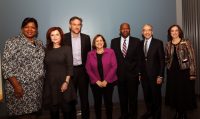WCC Forum Discusses the Impending Trump Presidency
Four accomplished journalists tackled the difficult task of predicting what a Donald Trump presidency will look like as they spoke at the annual Westchester Community College President’s Forum on Sunday.

New York Times columnist Maureen Dowd, Washington Post columnist Ruth Marcus and Wall Street Journal columnists Jason Riley and Bret Stephens appeared before a packed house for the forum titled “The Road Ahead: United or Divided.” The initiative raises funds for student scholarships.
Lester Crystal, former president of MacNeil/Lehrer Productions and its current senior adviser, moderated the 90-minute discussion, which was held in the college’s Hankin Academic Arts Building.
While the panelists said they were displeased by the thought of a Trump presidency, all of them said they hoped, for patriotic reasons, that he keeps an open mind as he assumes the highest office.
“I think that as a new president, he is entitled to pick people that reflect his philosophy,” said Marcus, adding that she has reservations about Trump’s temperament, competence and ideology, especially his early choices of key personnel.
Riley, who also serves as a senior fellow at the Manhattan Institute, said many journalists based on the East and West coasts miscalculated Trump’s strength with working class voters and were, therefore, surprised at the results. They focused more on the candidate’s tone and temperament, failing to comprehend that the electorate who voted for Trump were not as concerned about those traits as they were about electing someone they believed would solve their economic concerns.
Referring to the many personas that Trump has created for himself over the years, Dowd said Trump may be the most surprised by his own success.
“No one is more stunned than Donald Trump,” said Dowd, whose recent book is called, “The Year of Voting Dangerously: The Derangement of American Politics.” “I’m sure he’s up there (in Trump Tower) formulating who he’s going to be next.”
Comparing the Trump presidency to that of Warren G. Harding, the 29th president of the United States elected in 1920, who many historians view as one of the country’s worst presidents, Stephens, the author of “America in Retreat: The New Isolationism and the Coming Global Disorder,” said Trump might easily follow suit, “slowly unraveling the global order.”
Marcus said Trump doesn’t have the “self-awareness and personality to be scared out of his wits.”
Reflecting on how badly Hillary Clinton performed in the election with working class voters, Stephens said she failed to understand their issues. Small businesses that worry about compliance issues and their efforts to keep up with OSHA regulations, among other hardships, were indicative of those “non-deplorable Trump voters who couldn’t take it anymore,” he said.
“People had bigger concerns than Trump’s tone and temperament,” added Riley.
All of the panelists expressed uncertainty about what Trump as president. Marcus said Trump’s most hopeful words came the night of the election.
As for Obama’s legacy, most felt it would be greatly tarnished, if not obliterated, by a Trump presidency.
“So much of what he did, Trump can reverse with the stroke of a pen,” said Riley. Marcus reflected on it as a “legacy of sadness.”
“Fundamentally, his legacy was rewritten on election night,” said Riley, referring to the possibility that Obamacare, the Dodd-Frank Wall Street Reform and Consumer Protection Act and The Paris Agreement, would be dismantled by a Republican administration.
“Much of his legacy is now determined by his successor,” Marcus said.
Toward the end of the discussion, the audience had an opportunity to question the panelists. Some worried about the systems of checks and balances in a Trump White House, while others voiced concerns about continued voter suppression efforts and the proliferation of fake news and how mainstream media might respond.
“The biggest challenge for all of us is not to lose energy and not to be beaten down,” Marcus told the audience. “We, as journalists, have endless bandwidth to vent, and we need to keep doing that.”
Colette Connolly is a copywriter and p.r. expert. She owns Connolly Communications, which is based in Bronxville, New York. Colette specializes in providing content-rich, SEO-optimized press releases, articles, newsletters, brochures, and customer success stories.
